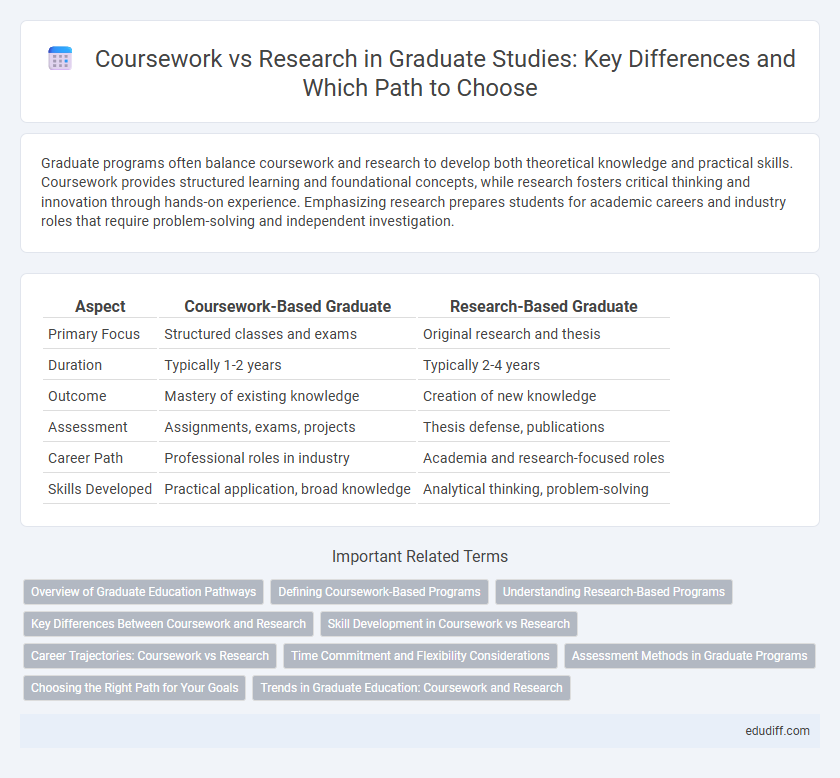Graduate programs often balance coursework and research to develop both theoretical knowledge and practical skills. Coursework provides structured learning and foundational concepts, while research fosters critical thinking and innovation through hands-on experience. Emphasizing research prepares students for academic careers and industry roles that require problem-solving and independent investigation.
Table of Comparison
| Aspect | Coursework-Based Graduate | Research-Based Graduate |
|---|---|---|
| Primary Focus | Structured classes and exams | Original research and thesis |
| Duration | Typically 1-2 years | Typically 2-4 years |
| Outcome | Mastery of existing knowledge | Creation of new knowledge |
| Assessment | Assignments, exams, projects | Thesis defense, publications |
| Career Path | Professional roles in industry | Academia and research-focused roles |
| Skills Developed | Practical application, broad knowledge | Analytical thinking, problem-solving |
Overview of Graduate Education Pathways
Graduate education pathways typically include coursework-based and research-based programs, each designed to meet different academic and professional goals. Coursework-focused graduate programs emphasize structured learning through classes, exams, and practical assignments, ideal for those aiming to enhance professional skills or transition fields. Research-based programs prioritize independent investigation, thesis development, and contribution to academic knowledge, suited for careers in academia, research institutions, or specialized industries.
Defining Coursework-Based Programs
Coursework-based graduate programs emphasize structured learning through a series of predefined classes and assignments, prioritizing the acquisition of theoretical knowledge and practical skills. These programs typically require completing credits from core and elective courses, fostering a broad understanding of the subject area without the necessity of original research contributions. Designed for students seeking professional development or career advancement, coursework-based pathways provide flexible and comprehensive education options beyond traditional thesis requirements.
Understanding Research-Based Programs
Research-based graduate programs emphasize the development of original knowledge through rigorous methodologies and critical analysis, distinguishing them from coursework-centered programs that prioritize structured learning and skill acquisition. Students in research-based tracks engage deeply with literature review, hypothesis formulation, and data interpretation, fostering expertise in their discipline's investigative processes. This approach cultivates advanced problem-solving abilities and prepares graduates for academic or scientific careers where innovation and empirical evidence drive progress.
Key Differences Between Coursework and Research
Coursework in graduate studies emphasizes structured learning through lectures, assignments, and exams designed to cover theoretical knowledge across a subject area. Research, on the other hand, involves independent investigation aimed at generating new knowledge, often requiring data collection, analysis, and critical evaluation of findings. Key differences include the mode of assessment, with coursework relying on tests and projects, while research is assessed through theses or dissertations that contribute original insights to the field.
Skill Development in Coursework vs Research
Coursework in graduate programs emphasizes structured learning and mastery of foundational theories, enhancing skills such as critical thinking, time management, and effective communication. Research cultivates advanced problem-solving abilities, independent inquiry, and the capacity to design and conduct experiments, fostering innovation and analytical depth. Both approaches develop complementary skill sets essential for professional expertise and academic contribution.
Career Trajectories: Coursework vs Research
Graduate students focusing on coursework often pursue professional careers in fields such as business, education, or public administration, where practical skills and applied knowledge drive advancement. Research-oriented graduates tend to follow academic or specialized industry careers, contributing to innovation and expertise through original studies and publications. Career trajectories diverge as coursework prepares for immediate implementation roles while research emphasizes long-term problem-solving and theoretical development.
Time Commitment and Flexibility Considerations
Graduate coursework typically demands a structured schedule with fixed class times and regular assignments, requiring consistent time commitment throughout the semester; research offers more flexibility, allowing students to allocate time based on project needs and personal productivity. Coursework calendars are often rigid, limiting the ability to adjust study hours, while research timelines can be adapted to align with experimental progress or data analysis stages. Time management strategies are crucial in both settings, but research demands greater self-discipline to balance open-ended tasks and deadlines effectively.
Assessment Methods in Graduate Programs
Graduate programs assess coursework through structured assignments, exams, and presentations that evaluate theoretical understanding and practical skills. Research assessment relies on thesis proposals, original research projects, and dissertation defenses, emphasizing critical analysis, methodology, and contribution to the field. These distinct assessment methods ensure comprehensive evaluation of a graduate student's expertise and academic proficiency.
Choosing the Right Path for Your Goals
Graduate students must evaluate their career objectives when choosing between coursework and research paths, as coursework provides structured learning ideal for professional advancement while research fosters critical thinking and innovation suited for academic or scientific careers. Coursework emphasizes mastering existing knowledge through classes and exams, enhancing practical skills applicable in industry settings. Research demands independent investigation and problem-solving, producing original contributions that are essential for pursuing PhD programs or careers in research-intensive fields.
Trends in Graduate Education: Coursework and Research
Graduate education increasingly balances coursework and research to meet evolving academic and industry demands. Coursework emphasizes structured knowledge acquisition and skill development, while research fosters critical thinking, innovation, and original contributions to the field. Current trends highlight interdisciplinary programs integrating both elements to prepare graduates for diverse career paths and advancing technologies.
Coursework vs Research Infographic

 edudiff.com
edudiff.com